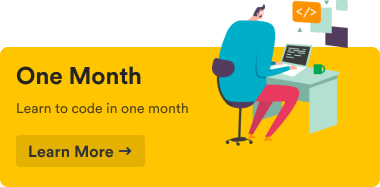Is Programming Hard?

If you’ve ever considered a career change, you’ve probably thought about coding. After all, programming jobs are growing 50% faster than the overall market, and jobs that require coding skills pay $22,000 more each year than jobs that don’t require coding skills. Software developers and software engineers earn over $100,000 a year on average, with high job growth projections by 2026. And US News & World Report, CNNMoney, and Payscale all put software developers at the top of their best jobs in America lists.
But is programming hard? In this article, we will explore how difficult it really is.
Many people worry learning to program is too difficult. After all, programming certainly has a reputation for being challenging. Don’t programmers write in zeros and ones all day? And sit around doing math? Here’s the good news: learning to program isn’t as hard as most people think. You don’t need to be a genius like Steve Wozniak to learn to program. But that doesn’t mean it is easy. It still takes a lot of work! Let’s take a look at what it’s like learning to program.
Another language
Software engineers have a special skill that makes them look like geniuses to outsiders: they know how to code. For novices, coding might seem akin to magic. Programmers type in a series of seemingly random lines, and suddenly the computer performs a task. But is learning to code hard?
At the simplest level, learning to code is like learning a foreign language—but with a lot fewer words! Whereas languages have hundreds of thousands of words, most programming languages have fewer than fifty keywords.
I’ve personally struggled much more, trying to learn a foreign language than learning to program. I picked up Python pretty quickly, but I still can’t speak Spanish, even though I studied it in school for over four years.
While it seems daunting, learning to code can be a simple, fun process. Especially because there are so many resources for self-taught programmers to advance their coding abilities, and master the coding skills required for entry-level tech jobs. From structured courses to books that allow self-paced learning, today’s self-taught programmer has access to more resources than ever before.
How Much Math?
Beginners often have the idea you can’t learn to program without being a math whiz, but the idea you need to be good at math to code is actually not true.
One reason for this misconception is because of the way programming is taught in schools. When you study computer science at a university, you don’t just learn to program: you study a bunch of other things as well, like math. For example, discrete math and calculus are often core requirements for a computer science degree.
Despite the way programming is taught at universities, you don’t need to be strong in math to learn to code. Yes, learning code does involve a little bit of math, but it doesn’t get more complicated than functions in algebra. The math you need to program is certainly nowhere near as complicated as calculus. The bottom line is if you can pass the first week of a high school algebra class, you are good enough at math to learn to program.
You may be thinking, “Well sure, I may not need much math to learn to program, but once it comes time to get a job, I will.” And that may be true. But it most likely isn’t. The amount of math you need to know as a software engineer varies by what type of programming job you pursue.
If you want to be a data scientist, then yes, you will need to know a lot of math. If you plan on going into web or app development, however, you do not. I’ve spoken with many web and app developers that have said they haven’t had to use any math their entire career.
Zeros and Ones?
Many aspiring programmers also have the idea that programmers sit around writing code in zeros and ones all day. That is not true either. When programming first was invented, coders did have write code in binary (zeroes and ones), which was incredibly challenging.
Fortunately, today, programmers have the option to write code in high-level programming languages like Python, which I consider to be the best programming language to learn first.
High-level programming languages like Python, Ruby, and JavaScript read more like English than someone unfamiliar with programming might expect. For example, to print the text Hello, World! in Python, you simply write
print("Hello, World!")
Compare that with writing Hello, World! in binary, and you can see why people get the impression that programming is too difficult!
0000000 7f 45 4c 46 01 01 01 00 00 00 00 00 00 00 00 00 |.ELF............| 00000010 02 00 03 00 01 00 00 00 80 80 04 08 34 00 00 00 |............4...| 00000020 c8 00 00 00 00 00 00 00 34 00 20 00 02 00 28 00 |........4. ...(.| 00000030 04 00 03 00 01 00 00 00 00 00 00 00 00 80 04 08 |................| 00000040 00 80 04 08 9d 00 00 00 9d 00 00 00 05 00 00 00 |................| 00000050 00 10 00 00 01 00 00 00 a0 00 00 00 a0 90 04 08 |................| 00000060 a0 90 04 08 0e 00 00 00 0e 00 00 00 06 00 00 00 |................| 00000070 00 10 00 00 00 00 00 00 00 00 00 00 00 00 00 00 |................| 00000080 ba 0e 00 00 00 b9 a0 90 04 08 bb 01 00 00 00 b8 |................| 00000090 04 00 00 00 cd 80 b8 01 00 00 00 cd 80 00 00 00 |................| 000000a0 48 65 6c 6c 6f 2c 20 77 6f 72 6c 64 21 0a 00 2e |Hello, world!...| 000000b0 73 68 73 74 72 74 61 62 00 2e 74 65 78 74 00 2e |shstrtab..text..| 000000c0 64 61 74 61 00 00 00 00 00 00 00 00 00 00 00 00 |data............| 000000d0 00 00 00 00 00 00 00 00 00 00 00 00 00 00 00 00 |................| * 000000f0 0b 00 00 00 01 00 00 00 06 00 00 00 80 80 04 08 |................| 00000100 80 00 00 00 1d 00 00 00 00 00 00 00 00 00 00 00 |................| 00000110 10 00 00 00 00 00 00 00 11 00 00 00 01 00 00 00 |................| 00000120 03 00 00 00 a0 90 04 08 a0 00 00 00 0e 00 00 00 |................| 00000130 00 00 00 00 00 00 00 00 04 00 00 00 00 00 00 00 |................| 00000140 01 00 00 00 03 00 00 00 00 00 00 00 00 00 00 00 |................| 00000150 ae 00 00 00 17 00 00 00 00 00 00 00 00 00 00 00 |................| 00000160 01 00 00 00 00 00 00 00 |........|
Lifelong learning
While programming is not too hard for most people to learn, if you want to become a software engineer, you do need to commit to becoming a life long learner.
Technology changes fast. Programming languages come and go. New frameworks and libraries pop up every day. If you want to stay relevant as a software engineer, you need to constantly be learning. I personally enjoy this. It is one of the reasons I love programming: because I love to learn new things.
Software developers must be willing to learn throughout their careers. As developer Brandy Morgan told CNNMoney, “Technology is changing all the time. Languages change all the time. Job postings change all the time. You’re going to be a forever student if you’re a programmer.”
If you don’t enjoy always learning new things, it will be a big problem. You can still learn to program, but you might want to think twice about becoming a software engineer.
The Degree Question
Along with the question “is programming hard?” many prospective programmers ask, “do you need a degree in software engineering?” In fact, many software developers and software engineers are self-taught. Software development is a trade, so with the right tools and some dedication, novices can teach themselves the skills necessary for a tech job.
And employers recognize the value of self-taught developers. A 2017 study found that only one in four IT and programming job postings asked for a computer science degree. Other job titles saw even lower numbers asking for a computer science degree. Only 9% of ads for data analysts asked for a CS degree, while just 3% of engineer ads and 6% of designer ads requested a computer science degree.
Not only are tech companies willing to hire self-taught programmers; they are also making an effort to recruit them. Facebook, LinkedIn, and Pinterest all have programs designed to employ programmers without degrees.
In short, many employers hire candidates without specialized college training in computer science. Earning a degree isn’t the only path to a career in software engineering—across the industry, self-taught programmers get hired every day.
The tech job market can seem intimidating. Companies expect a strong resume, an impressive portfolio, and high marks on the technical interview. Landing a programming job is another reason people might wonder “is software engineering hard.” Even if you have the skills, how do you get a job?
The good news is that self-taught programmers can shine on the job market by showcasing their skills and networking. Want to show off your programming abilities? Design a program and include it in your portfolio. Contribute to a project on GitHub. Pursue freelance opportunities to expand your portfolio.
And then there’s the technical interview. Tech companies use the technical interview to test more than your programming skills. They also measure how you approach problems, your ability to analyze a situation, and your logic skills. It’s not just solving a problem—it’s how you solve it. Passing a technical interview is challenging, but definitely doable.
Is Programming Hard? No.
Is learning to program hard? No. But that doesn’t mean it is easy either. You won’t be a programmer the first day you try. But if you stick with it, you will be successful learning to code.
If you want to become a software engineer, you need to get used to learning new things. Programming and becoming a software engineer are not the same thing. And while becoming a software engineer without a degree is doable, it will be nearly impossible to find success if you don’t like constantly learning new things. Before pursuing a software engineering career, consider if it’s the best path for your career goals and strengths.
Learning to program is incredibly rewarding. Don’t let the question “Is programming hard?” stop you from pursuing a programming career. Instead, consider what steps you can take today, this week, and this month to move one step closer to your goal.
Want to learn to program professionally from home? I’m offering a FREE trial of my training program, Five-Week Coder. You will get the opportunity to join over 1,000 other people in my private Facebook group, get weekly coaching sessions with yours truly, and watch all of my lessons and lectures. I will help take you from a beginner to getting paid for your first freelance programming project. I can’t wait to work with you!





